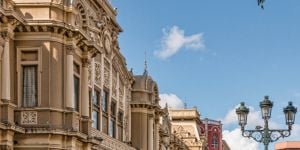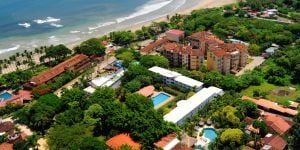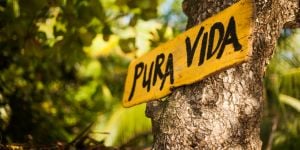New guy
Last activity 03 April 2014 by Lapalmaman48
4400 Views
19 replies
Subscribe to the topic
Post new topic
Hi,
My name is Mik, and I'm seriously considering purchasing property in Costa Rica at a Eco Development through Recap Investments inc in Canada. I'm after much info here, and hoping to be steered in the right direction.
Who I should be linked in with/who to avoid
What to watch for, ask, be ware of
Where I need to look, government and essential services are predominant, is good, bad
When things aren't so groovy (annually) for weather, travel, economy etc.
And anything else I've missed.
Please link me in!
Cheers.
Have you visited their project? Visited Costa Rica? Many 'Eco developments' are now being offered ... and some will never be completed.
Read this previous post There are partially completed projects all over the country, some with no more than a very fancy gate.
Suggest you wait until you can perform your due diligence with your feet on the ground. Best to visit for an extended time and rent in different areas to see if it is right for YOU...before you purchase anything.
(Moderated: Please post in the section housing in Costa Rica)
Unfortunately there have been many con artists in the development racket in Costa Rica.
So you will just have to do your due diligence on the particular developer and development by asking around. Asking here is a good start; ask on other forums as well.
Google (or duckduckgo.com) the names of all the principals involved in the development and check them out closely.
Before moving to Costa Rica one needs to first visit there for a month or more to get a feel for it - there is no "Paradise" anywhere, there are always down sides, so you need to live in Costa Rica for awhile to find out what the downsides will be for YOU.
Most of all go and live in the area you are thinking of buying in and get to know how it is there: the people, the weather, the stores, doctors, hospitals, etc.
The development you are thinking of buying in might be fantastic and you might love it and it might be the best decision you ever made, to buy there. Or it could turn out to be the biggest mistake you ever made. Your due diligence is what will make the difference.
Then, after you've decided you really do want to buy there, find a great attorney who doesn't just rubber stamp the purchase but does HIS due diligence in carefully investigating the deal and making sure all the i's are dotted before you sign and put up a down payment. DO NOT USE THE ATTORNEY OF THE SELLER UNDER ANY CIRCUMSTANCES! Get an attorney who will represent YOU and only YOU in the deal. I almost lost $5k by NOT following this rule, so heed my advice!
All that said, I do not want to discourage you from buying in Costa Rica. I have bought there myself and plan to build there and live there for the rest of my life. But I did my due diligence and made a couple mistakes along the way. I know many happy expats in Costa Rica and I highly recommend it! What I want to discourage though is people who don't check everything out first and buy without really knowing what they are getting into, especially when it's a "development" - which can be good or which can be very bad, depending on who the developers are and if they have a good track record etc.
I do know a little bit about this project directly and also have some indirect knowledge. I had a guest staying with me who was Canadian and felt that this Canadian company would be reliable. Unfortunately the principals are not or at least some are not but they' have a great call center. My client and some others who had an interest in property took a field trip down there with the architect and were told that 100+ houses would be built by year end and as we all know who live here that is pretty impossible. There are none there right now.
Bottom line...don't trust people based on where the company is from. Do lots of research and get a good lawyer.
Yes, neither does it make a difference if they speak English!
When choosing a development, look past the fancy gate and wait until you see proof that all of the utilities are in and do not believe that they will be installed in the next month...
Even better to see some complete and occupied homes.
I base a person by their reputation and the quality they provide. Dealing with Tico contractors can be an absolute nightmare, which is why the banks who finance projects in Costa Rica only give the builder a few dollars each month to work with, as they are worried the builder will spend the money before finishing the project. What perecentage of Tico built home projects go "over budget", everyone knows that i's a pretty high percentage.
Hi Mike, the advice by all the others is "spot on" great advice, but my advice would also be simpler, it would be to "slow down".
I have been living here for almost 12 years, and whenever I hear of someone buying before visiting and seeing their options in different areas of the country, it baffles me. It's taken ME a long time to find reputable properties and builders that do it right the 1st time "on budget", and legal advice that I can rely on.
FYI, about that "slow down"...
Costa Rica is not running out of land or properties, and won't in my lifetime. 90% of the country is still raw land.
If someone is all out of their "last lots", and no houses started, then that is not a good sign in and of itself.
1st, you need to find the area of Costa Rica that is perfect for you.
2nd, you need to spend some time in the Costa R=ica culture. I love it, but it's a personal choice, and if you don't like the people or culture, who cares what the land costs.
my suggestion? Rent an SUV and see the Country for a solid two weeks, a couple days in each "zone", you will be happy you did. And those 2 weeks if they are in May-October rainy season, will be completely different (wetter) then December - March summertime in Costa Rica. And those differences are extreme in some areas. So best for you to know "with boots on the ground" .
Guanacaste is completely different than the Central North (Arenal / Monteverde area) and those 2 are again completely different than the VERY EXPANSIVE Central Valley that goes from 6000 ft altitudes to 300 ft near orotina, or the very popular Central Pacific, or the more remote Southern Pacific (Dominical-Uvita and to the Osa) or Central southern highands near San Isidro de General, or even the Caribbean side. I have never lived in an area with no much diversity in such a small area, dozens of different microclimates and regional cultural differences. Weather, topography, access to services, density or lack of it, etc etc.
I am assuming this will be a major life decision, and these differences can make you future wonderful, or a pain in the neck to adjust to, and you need to be happy where you are moving to, and there is NO Rush, quite the opposite in fact.
You can email or message me directly if you like.
and when it's all said and done, NEVER let $ leave your hands without (verified) title being transferred to your Costa Rican Corporation simultaneously by your trusted attorney doing the transfer. There is simply no reason to take that risk in 2014.
Hope that helps,
CruzinCostaRica
I have found that many potential expats tend to 'change their mind' once they have looked into the requirements of living here, legally
One place to look and another
What CruzinCostaRica said is right (and I did also say you should visit first, just for the record!).
The idea of touring around the country is a great idea.
I can recommend George Lundquist's tour for people considering moving to Costa Rica. He focuses on (or at least did when I took it 5 years or so ago) the Central Valley from Cartago area to San Ramon and various places in between. But if you might want to live in the "greater Central Valley area", it's a really good tour and he gives you a good education on living in Costa Rica, as well. Just google his name if you're interested. We had a lot of fun on the tour while also learning a lot, and when I say learning a lot - I'd already been to Costa Rica on vacations, and lived there for awhile, yet I learned a lot!
Kohlerias I have to agree with you, a very high percentage of people who come to Costa Rica with the thought of retiring here end up choosing a different destination. The biggest problem is the overly inflated home prices, and the higher costs of day to day survival. We have a gated community close to us where over 75% of the home owners have thrown in the towel and left the country. It is so hard to rent out the homes that Tico families are now moving into them.
The homes are so big that it costs about $400. per month just to keep them cool, but the Ticos who rented them do not use the AC. It's a sad situation to see what was such a great retirement destination deteriorate so dramatically, and the sad part is there is no hope of recovery. The massive government import taxes, higher Caja fees for Pensionados and Rentistas, luxury taxes for homes worth more than $200,000 And a lot of red tape to even get a drivers license.
The days of surviving on just a Social Security check have come to an end.
You said "The days of surviving on just a Social Security check have come to an end." This is a HUGE factor in my relocation efforts. Is all this stuff I've been reading from "International Living" true or hype. I'm only renting, no intention of buying. Can I really live comfortably on $1,500 - $2,000 USD month in Costa Rica?
Are there any WHITE sand beaches ( Not grey or brown ) anywhere? Did you also check out Panama, Ecuador or any others to relocate to? How do they compare?
Thank you!
Chris
Hi Chris - I can't check out anything else as I've purchased a property in Costa Rica already, which is located a few minutes from the beach. You might be able to survive on social security if you don't buy a car, don't have a habbit of eating out in restaurants, and don't blow your money on electrical power - it's high here for those who use AC.
Stay at a cooler altitude to avoid needing AC, and have access to everything by walking. Groceries here are the same price as in North America, and the quality of the items is much lower. If you are a rich and black beans person you'll have a better chance of surviving here on a fixed income. The beef here is like rubber, so maybe you'll become a vegetarian. The fish is fantastic, and the fruits and vegetables are not expensive. Finally.... don't pay a high rent.
Almost every home in Costa Rica which is suitable for North Americans are grossly over priced, and so are some of the rents. If you wish to talk to me off line I know of something. tje2tk(at)ymail.com
Chris Douglass wrote:You said "The days of surviving on just a Social Security check have come to an end." This is a HUGE factor in my relocation efforts. Is all this stuff I've been reading from "International Living" true or hype. I'm only renting, no intention of buying. Can I really live comfortably on $1,500 - $2,000 USD month in Costa Rica?
Are there any WHITE sand beaches ( Not grey or brown ) anywhere? Did you also check out Panama, Ecuador or any others to relocate to? How do they compare?
Thank you!
Chris
Chris, some other forum members will disagree but I insist on stating the truth I have found for myself that food prices are cheaper in Costa Rica than in the USA as are rent and other things.
Maybe it depends somewhat on where you are used to living in the USA. I live in Los Angeles and I can tell you food prices are cheaper in Costa Rica unless you buy imported stuff. SOME food is as high or higher in Costa Rica. Cheese and beer for example are higher in Costa Rica, in general. Staples and veges and fruit are generally cheaper in Costa Rica than in the USA. Labor is far cheaper in Costa Rica.
I have been living in Costa Rica off and on and visiting Costa Rica over 20 years and I also know a dozen or so people - Ticos and Americans and Europeans - who live there full time so I know how much it costs to live in Costa Rica. Rent can be cheaper. Food can be cheaper. Utilities can be cheaper. Internet is about the same or more than in the USA. Phone is cheaper in Costa Rica. Gasoline and electronics and appliances generally cost more in Costa Rica. Food at the BEACH MAY BE as high as in the USA - that I cannot say for sure; but in San Ramon where I am most familiar with, food is generally cheaper in Costa Rica.
When you ask "Can I live on $1500-2k/month?" if you mean just YOU, then the answer is yes. I'd even say a couple can live on that - in fact I KNOW they can; I know some who are doing it. Depending on what kind of lifestyle you expect, yes, you can live on $1500/month. $2k should be easy.
My advice to live more cheaply:
*Buy groceries at the feria (local farmers market). Eat local food, not imported.
*Live above 2500 feet where you will not need a.c. - a fan or two will do.
*Once you're living in the area look around for a good cheap rental. You can find good deals. I have done so on numerous occasions. You should not need to spend over $400/month - maybe substantially less - for a small place for one or two people
*If you can live without a car you will save a lot of money. If you need a car, drive it minimally and use buses when you can.
*Beach town rent and food will cost more than mountain town rent and food
Maybe others can chime in on other ways to reduce your cost of living.
The bottom line is a single person can live well on $1500-$2000 a month. For a couple I'd say $2k would be better but it can also be done on $1500/month.
International Living is designed to promote real estate sales and such so take their info with a grain of salt.
2nd bottom line:
NEVER MOVE TO Costa Rica or any foreign country without spending as long as possible there first before you decide to move - that means a minimum of 30 days, preferably 60-90 days living there before moving. Try various areas that you think you'll like, then choose 1 or 2 to live in for 30 days or more at a time.
White sand beaches are not plentiful in Costa Rica. I'm not a beach nut so I can't tell you where the white sand is. I know there are some up in northern Costa Rica but that is an expensive area and far from any main cities as well.
Panama I did check out and may check it out again some day, once I'm living in Costa Rica . My exploratory trip there to look at places to live was less than convincing for me and the friend who went with me. We both found Costa Rica much friendlier and attractive as a place to live. Your mileage may vary.
Panama has better infrastructure but it's also kind of a police state, much more like the USA is becoming which is one reason I don't want to live in the USA. In Panama my experience was we were always being stopped by police or border people to check our i.d.'s and it was annoying as hell, just not my cup of tea. I've never been stopped in Costa Rica like that, though I know Costa Rica also is getting more U.S.-like in that way, what with more traffic tickets and higher fines than ever before. However I still find Costa Rica much less invasive and less regulated than in the USA. At least in the town I spend most of my time in there (San Ramon) the police don't bother people. Nor have I been hassled on the highway/freeway going to San Jose'. But in Panama it seemed the police were everywhere, probably because of the cocaine problem. (?) Note that my friend and I are conservative looking guys, not hippies or bums or anything so it wasn't for that reason we were being stopped, EVERYONE was being stopped and hassled in Panama.
I found people in Panama friendly but not AS friendly over all as in Costa Rica.
Another difference is that Panama generally does not have as much free-flowing nature as Costa Rica does. They say it has more acreage of forest, but the parks are kind of off to the side like they are in the USA whereas in Costa Rica the forests are everywhere, all around you as you drive throughout the country.
Hi, Get a an honest lawyer, who will work for you. Is the property segregated? If yes they can provide you with a Finca number. Check it out on the Registro Nacional. Will give details on the property. Get an independent appraisal on the property. That will give you the true value of the property. Do not give them any money in advance. Just because they are Canadian, that does not mean they operate with, values honesty, what we are use to in Canada.
Gather information on Costa Rica. Not from the people who are trying to sell you the property. Like food prices, same price as in Canada or even higher price. Buying from locals we get charged three times what the locals pay. Building material is very expensive. Bottom line Costa Rica is not cheep.
I
I wish some one would have given me this advice.
I like to refer people to a couple of websites that I think are really honest and really helpful. #1 are my friends Paul and Gloria at retireforlessincostarica.com They track their expenses every month and post them on their website. They live on less than $2,000 a month and I can tell you from first hand knowledge that they are having a great time doing it. Another site that is always good for an honest look at CR is therealcostarica.com I haven't visited that one for awhile but it was helpful when we first started doing our research.
do your research and best of luck! Maybe we'll run into you one day in CR.
Take the time to really check out the area and rent first. Much easier to move than to sell.
No matter how many 'short trips' you make, you will find out that living here is much more expensive than you think it will be, according to what you will read on blogs and forums.
Mik, Send me an email at tje2tk@gmail.com
I'm also a Canadian.
Articles to help you in your expat project in Costa Rica
 Work in Costa Rica
Work in Costa RicaA low unemployment rate and a strong economy set Costa Rica apart from its neighbours. If you have fallen in love ...
 The health care system in Costa Rica
The health care system in Costa RicaCosta Rica has received international praise for its modern healthcare system, and both citizens and legal ...
 Key facts for international students in Costa Rica
Key facts for international students in Costa RicaCosta Rica is an attractive and affordable country in which to study, with one of the highest literacy rates in ...
 Setting up a business in Costa Rica
Setting up a business in Costa RicaThe government's positive attitude towards foreign investment, as well as the country's developed ...
 Motorcycle Angel
Motorcycle AngelMotorcycle Angel
 Buying a property in Costa Rica
Buying a property in Costa RicaCosta Rica's political and economic stability, as well as its natural beauty and pleasant climate, make it an ...
 Retiring in Costa Rica
Retiring in Costa RicaMany retirees are attracted by Costa Rica's stable democracy, excellent healthcare, enjoyable climate, natural ...
 How To Become A Resident In Costa Rica
How To Become A Resident In Costa RicaResidency In Costa Rica - Types of Residency
Find more topics on the Costa Rica forum



